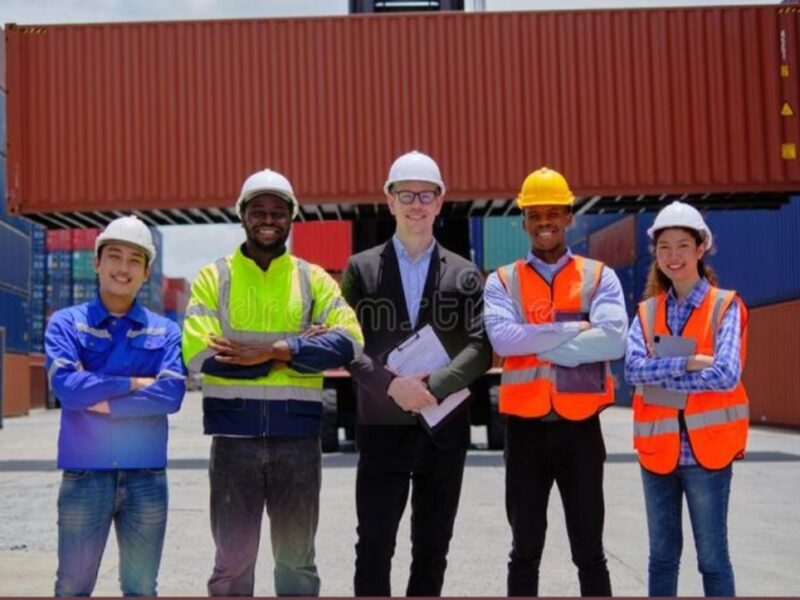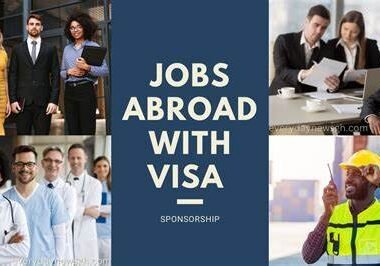Australia, with its pristine landscapes, vibrant cities, high quality of life, and robust economy, has long been a magnet for skilled professionals worldwide. Yet, for many, the dream of working and living Down Under is often accompanied by the formidable challenge of securing a work visa. This is where the concept of “full visa sponsorship” becomes a game-changer – an employer’s commitment to not only offer you a job but also to be your pathway to legal employment and residency in Australia.
This comprehensive guide aims to demystify the process, spotlighting the sectors and types of companies that are most likely to offer full visa sponsorship, detailing what that sponsorship entails, and providing actionable advice for skilled foreign professionals seeking to make Australia their new home.
Before diving into specific companies, it’s essential to understand the visa sponsorship process in Australia. The Australian government has implemented a points-based system to attract skilled workers who can contribute to the country’s economy. To be eligible for a work visa, applicants must meet specific requirements, such as:
Meeting the required English language proficiency
Having a qualification or experience in a skilled occupation
Meeting the character and health requirements
It’s crucial to understand what “full visa sponsorship” genuinely means in Australia. While the precise benefits can vary, at its core, it signifies that an Australian employer has nominated you for a specific position and is willing to undertake the legal and financial responsibilities associated with bringing a foreign worker into the country.
1. Employer Nomination/Sponsorship: The company applies to become an approved sponsor with the Department of Home Affairs or nominates a specific position for an overseas worker. This is the fundamental step.
2. Visa Application Support: The employer provides the necessary documentation and support for your visa application. This often includes:
Labour Market Testing (LMT): Proving that no suitable Australian citizen or permanent resident could be found for the role.
Nomination Application Fee: The employer typically covers this government fee.
Skilling Australians Fund (SAF) Levy: A mandatory levy paid by the employer to the government, contributing to training for Australian workers. This can range from a few hundred to several thousand dollars, depending on the business turnover and visa duration.
3. Financial Undertaking: The employer commits to meeting certain obligations, such as ensuring the sponsored worker is paid at least the Temporary Skilled Migration Income Threshold (TSMIT) and covering repatriation costs if the worker’s employment ends under certain circumstances.
4. Beyond the Basics (where “Full” comes in): While the above are standard, “full sponsorship” often extends to:
Visa Application Fees: Covering the actual visa application fee for the applicant and their accompanying family members. This can be substantial.
Migration Agent/Legal Fees: Engaging and paying for professional migration agents or lawyers to handle the complex application process.
Relocation Support: While not always included, some companies, especially for senior or highly niche roles, may offer relocation packages, including flights, initial accommodation, and shipping costs.
Temporary Skill Shortage (TSS) Visa (Subclass 482): The most common employer-sponsored visa, allowing you to work in Australia for up to 2 or 4 years, depending on the occupation list (Short-term or Medium-term Stream). This visa can often lead to permanent residency.
Employer Nomination Scheme (ENS) Visa (Subclass 186): A permanent residency visa, either through the Direct Entry Stream (for those with sufficient experience and qualifications) or the Temporary Residence Transition Stream (for those who have held a 482 visa with the same employer for a certain period).
Skilled Employer Sponsored Regional (Provisional) Visa (Subclass 494): A provisional visa for working in regional Australia, valid for 5 years, with a pathway to permanent residency (Subclass 191 visa) after 3 years.
Designated Area Migration Agreements (DAMAs) and Labour Agreements: Special agreements between the Australian government and specific regions or industries to address unique skill shortages, often offering more flexible pathways.
1. Atlassian
Atlassian is a leading software company that develops products like Jira, Trello, and Bitbucket. With offices in Sydney, Melbourne, and Brisbane, Atlassian is committed to hiring the best talent from around the world. They offer a comprehensive relocation package, including visa sponsorship, to help foreign workers settle in Australia.
2. Canva
Canva is a popular graphic design platform that has become a household name in Australia. With a strong focus on innovation and creativity, Canva is always on the lookout for talented individuals to join their team. They offer visa sponsorship to foreign workers, as well as a range of other benefits, including flexible working hours and a generous parental leave policy.
3. Microsoft Australia
Microsoft is a global technology giant with a significant presence in Australia. With offices in Sydney, Melbourne, and Brisbane, Microsoft Australia offers a range of job opportunities in fields like software engineering, sales, and marketing. They provide visa sponsorship to foreign workers, as well as a comprehensive relocation package to help them settle in Australia.
4. Telstra
Telstra is Australia’s largest telecommunications company, with a long history of innovation and customer service. With a diverse workforce and a commitment to diversity and inclusion, Telstra is an attractive employer for foreign workers. They offer visa sponsorship to eligible candidates, as well as a range of other benefits, including flexible working hours and a generous employee discount program.
5. ANZ Bank
ANZ Bank is one of Australia’s largest banks, with a significant presence in the Asia-Pacific region. With a diverse workforce and a commitment to innovation and customer service, ANZ Bank is an attractive employer for foreign workers. They offer visa sponsorship to eligible candidates, as well as a range of other benefits, including flexible working hours and a generous employee bonus program.
6. CSIRO
CSIRO (Commonwealth Scientific and Industrial Research Organisation) is Australia’s national science agency, with a focus on innovation and scientific research. With a diverse workforce and a commitment to collaboration and knowledge-sharing, CSIRO is an attractive employer for foreign workers. They offer visa sponsorship to eligible candidates, as well as a range of other benefits, including flexible working hours and a generous employee development program.
7. Australian Government Departments
Various Australian government departments, such as the Department of Home Affairs, the Department of Defence, and the Australian Taxation Office, also offer visa sponsorship to foreign workers. These departments often have a diverse range of job opportunities available, from policy development and program management to IT and cybersecurity.
8. PwC Australia
PwC Australia is a leading professional services firm, providing audit, tax, and consulting services to clients across a range of industries. With a diverse workforce and a commitment to innovation and customer service, PwC Australia is an attractive employer for foreign workers. They offer visa sponsorship to eligible candidates, as well as a range of other benefits, including flexible working hours and a generous employee development program.
9. Deloitte Australia
Deloitte Australia is another leading professional services firm, providing audit, tax, consulting, and financial advisory services to clients across a range of industries. With a diverse workforce and a commitment to innovation and customer service, Deloitte Australia is an attractive employer for foreign workers. They offer visa sponsorship to eligible candidates, as well as a range of other benefits, including flexible working hours and a generous employee development program.
10. Accenture Australia
Accenture Australia is a leading global management consulting and professional services firm, providing services in strategy, consulting, digital, technology, and operations. With a diverse workforce and a commitment to innovation and customer service, Accenture Australia is an attractive employer for foreign workers. They offer visa sponsorship to eligible candidates, as well as a range of other benefits, including flexible working hours and a generous employee development program.
High-Demand Roles: Doctors (General Practitioners, Specialists), Registered Nurses (all specialisations), Allied Health Professionals (Physiotherapists, Occupational Therapists, Radiographers, Sonographers, Medical Scientists), Aged Care Workers.
Companies/Organisations Generally Known for Sponsorship:
Public Hospitals and Health Services: State and Territory Health Departments (e.g., NSW Health, Queensland Health) are major employers and often sponsor.
Ramsay Health Care: Australia’s largest private hospital operator.
St Vincent’s Health Australia: A large not-for-profit health and aged care provider.
Aged Care Providers: Large operators like Opal HealthCare, Regis Aged Care.
Medical Centres/Clinics: Smaller practices, especially in regional areas, may sponsor GPs and specialists.
Crucial Note: Overseas health professionals must meet specific registration requirements with Australian bodies (e.g., AHPRA for most health professions) before they can be sponsored.
12. Engineering & Infrastructure:
High-Demand Roles: Civil Engineers, Structural Engineers, Electrical Engineers, Mining Engineers, Project Managers, Mechanical Engineers, Geotechnical Engineers.
Companies Generally Known for Sponsorship:
BHP, Rio Tinto, Fortescue Metals Group (FMG): Mining behemoths with continuous demand for engineers and skilled trades in their remote operations.
CPB Contractors, Lendlease, John Holland: Major construction and infrastructure companies.
SMEC, GHD, AECOM, Jacobs: Large engineering consulting firms.
Utilities: Companies in energy, water, and telecommunications (e.g., AGL, Telstra, various state-owned utilities).
13. Mining & Resources:
High-Demand Roles: Mining Engineers, Geologists, Metallurgists, Surveyors, Heavy Diesel Mechanics, Drillers, Operators (often requiring specific experience with large machinery).
Companies Generally Known for Sponsorship:
BHP, Rio Tinto, FMG: As mentioned above, these are primary employers.
Newcrest Mining, South32, Glencore: Other major players in the resources sector.
Mining Services Companies: Contractors that support mining operations (e.g., Thiess, Macmahon).
14. Trades & Construction Management:
High-Demand Roles: Plumbers, Electricians, Carpenters, Welders, Motor Mechanics, Bricklayers, Civil Construction Managers, Site Supervisors.
Companies Known for Sponsorship:
Many medium-to-large construction companies.
Specialised trades businesses, particularly those working on commercial or industrial projects.
Companies participating in DAMAs (Designated Area Migration Agreements) in regional areas are often specifically designed to sponsor skilled trades.
Critical Skill Shortages: Australia faces persistent skill shortages in various sectors. When local talent is scarce, companies look globally to fill essential roles.
Access to Niche Expertise: Certain high-tech or specialized industries require unique skills often found only in a global talent pool.
Global Competitiveness: To remain competitive on the world stage, Australian businesses need access to the best talent, regardless of their nationality.
Diversity and Innovation: International employees bring diverse perspectives, experiences, and ideas, fostering innovation and a richer workplace culture.
Growth and Expansion: Companies undergoing rapid growth or expanding into new markets often need to scale their workforce quickly, necessitating reliance on skilled migration.
While these companies offer visa sponsorship to foreign workers, it’s essential to note that the sponsorship process can be complex and competitive. Here are some tips for foreign workers seeking visa sponsorship in Australia:
Research, research, research: Research the company and the role thoroughly to ensure it’s a good fit for your skills and experience.
Meet the eligibility criteria: Ensure you meet the eligibility criteria for the visa and the role, including the required qualifications, experience, and English language proficiency.
Update your resume and online profiles: Make sure your resume and online profiles (e.g., LinkedIn) are up-to-date and showcase your skills and experience.
Network and make connections: Network with people in your industry and make connections with recruiters and hiring managers.
Be prepared for the application process: Be prepared for the application process, including the submission of documents, interviews, and assessments.
Securing full visa sponsorship is highly competitive. Here’s how to stand out:
1. Possess In-Demand Skills: Research Australia’s Skilled Occupation Lists (SOL, MLTSSL, STSOL, ROL) and the Labour Market Insights website to identify occupations with persistent shortages. Your skills should align perfectly.
2. Demonstrate Strong English Proficiency: Unless exempt, you’ll need to pass an English language test (e.g., IELTS, PTE Academic) to a high standard. Excellent communication skills are also vital for workplace integration.
3. Have Relevant Experience and Qualifications: Employers look for candidates with proven work experience (usually 2-5+ years for most sponsored roles) and qualifications recognised in Australia.
4. Tailor Your Resume and Cover Letter: Highlight how your skills and experience directly address the job requirements and Australian context. Please ensure you’re willing to relocate and committed to a long-term role.
5. Target the Right Companies: Focus your efforts on large companies and those in the high-demand sectors listed above. Look for their “Careers” or “Global Talent” sections on their websites.
6. Network Proactively: Connect with professionals in your field in Australia on LinkedIn. Attend virtual job fairs or industry webinars. Sometimes, internal referrals can open doors.
7. Consider Regional Opportunities: Positions in regional Australia are often less competitive and can offer more straightforward pathways to permanent residency through visas like the Subclass 494.
8. Be Patient and Persistent: The sponsorship process can be lengthy and complex. Be prepared for multiple interview stages and a waiting period for visa processing.
9. Consider Professional Registration: For many professions (e.g., healthcare, engineering, teaching, trades), you will need to register with the relevant Australian professional body before you can work or be sponsored. Begin this process early if possible.
10. Engage with Reputable Migration Agents: While not mandatory, a registered migration agent (MARA-registered in Australia) can provide invaluable advice, assist with visa applications, and sometimes have connections to companies looking to sponsor.
Where to Look for Sponsored Jobs
Company Career Pages: The best place to find genuine sponsorship opportunities. Look specifically for roles that mention “visa sponsorship” or “international applicants.”
LinkedIn: Use filters for “visa sponsorship” or “relocation assistance” in your job searches. Many companies post directly here.
Seek, Indeed, Jora: Australia’s largest job boards. Filter by industry and keywords like “sponsorship,” “482 visa,” “overseas applicants.”
Specialised Recruitment Agencies: Many agencies focus on specific sectors (e.g., healthcare, IT, mining) and have experience placing international candidates.
Australian Government Resources: The Department of Home Affairs website provides updated information on visa types and employer sponsorship guidelines. The Labour Market Insights website offers data on skills in demand.
Challenges and Considerations
Even with full sponsorship, be aware of potential hurdles:
Competition: You are competing with both Australian residents and a global pool of talent.
Costs Not Covered: While “full” sponsorship covers a lot, there might still be personal costs like initial living expenses, non-sponsored family member applications (if applicable), and professional migration agent fees if you choose to hire one independently.
Visa Conditions: Sponsored visas often come with conditions (e.g., working only for the sponsoring employer, minimum salary).
Cultural Adjustment: Moving to a new country involves adapting to a new culture, workplace norms, and potentially a different lifestyle.
Processing Times: Visa processing times can vary significantly, from a few weeks to several months.
Australia is a fantastic destination for foreign workers, with its strong economy, diverse culture, and stunning landscapes. While the visa sponsorship process can be complex and competitive, there are many companies in Australia that offer full visa sponsorship to foreigners. By researching these companies, meeting the eligibility criteria, and being prepared for the application process, foreign workers can unlock new opportunities and build a successful career in Australia.
The dream of a professional career in Australia, backed by full visa sponsorship, is an achievable reality for skilled foreign professionals. By understanding the landscape of Australian recruitment, focusing on in-demand industries, meticulously preparing your application, and leveraging the right resources, you can significantly enhance your chances of securing that coveted sponsorship. While the journey may require patience and persistence, the quality of life and career opportunities that await make the Australian dream a compelling pursuit for global talent. Always remember to cross-reference information with official Australian government sources for the most accurate and up-to-date visa requirements and policies.







4 comments
I constantly spent my half an hour to read this weblog’s articles or reviews everyday along with a mug of coffee.
I know this if off topic but I’m looking into starting my
own weblog and was wondering what all is required to get set up?
I’m assuming having a blog like yours would cost a pretty penny?
I’m not very internet smart so I’m not 100% sure. Any suggestions or advice would
be greatly appreciated. Thank you
Hello, I want to subscribe for this webpage to obtain newest updates, so where can i do it please assist.
Hi friends, its fantastic paragraph regarding educationand fully defined, keep it
up all the time.